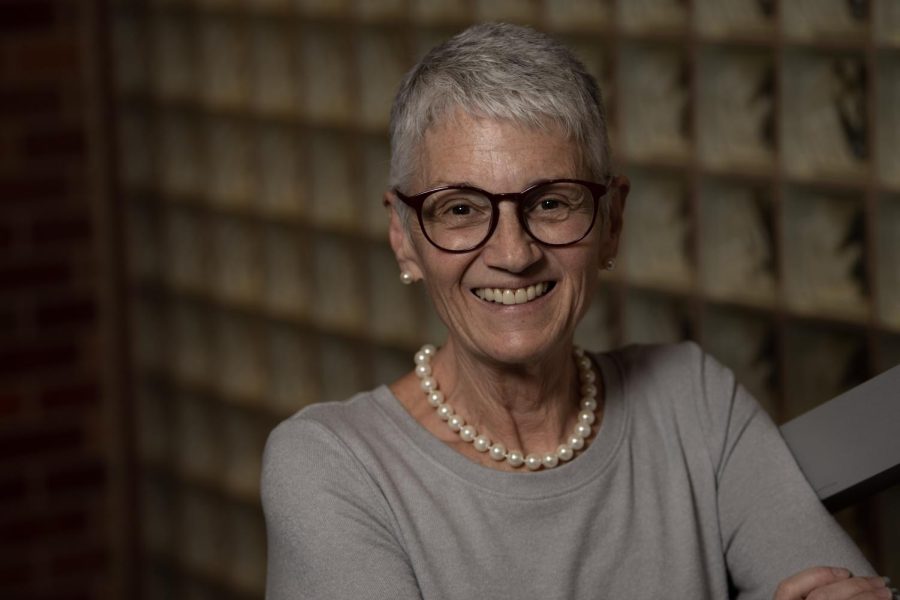Carson College of Business associate professor recognized by United Nations
Granger Cobb Founder Nancy Swanger listed as world’s top 50 leaders in senior living
Nancy Swanger was one of four American honorees.
January 23, 2023
What once started as a little classroom curriculum soon became the mother degree for its course, something not even the United Nations could ignore.
On Sept. 22, 2022, Nancy Swanger was one of 50 leaders worldwide recognized by the United Nations as part of the first-ever “Healthy Ageing 50: leaders transforming the world to be a better place to grow older.” With over 500 global nominations and an expert panel of reviewers consisting of many international organizations, Swanger was one of four Americans, and the only honoree from Washington state, selected for the honor.
Swanger began working at WSU in August 2000, starting out as a professor for the hospitality program at the Carson College of Business. In 2009, Swanger was promoted to director of the School of Hospitality Businesses Management, a position that would soon lead to something much bigger than herself.
During her time as director, four company presidents and chief executive officers from extremely well-established senior living companies, Aegis Living, Merrill Gardens, Leisure Care and Emeritus, came to Swanger looking to put WSU’s internationally known hospitality program with their reputable companies, Swanger said.
“Some folks approached me about this idea of senior living and said, ‘hey, you’ve got this great hospitality program, and we have this great senior living company, we ought to be working together,’” Swanger said. “I didn’t have any idea what he was talking about. My parents still lived in their own home, all I could think about was nursing homes, and I’m thinking, ‘no, what is happening here?’”
Swanger and four senior living executives soon created the first WSU senior living course, Introduction to Senior Living Management, in order to expose hospitality students to the idea of senior living. This course was guided to expose the socialization factors of senior living, being active, engaged, peaceful and “living life to the fullest,” Swanger said.
William Pettit, Merrill Gardens President, worked closely with Swanger to jumpstart the course. The goal of the course, and the now institute, is to train a new group of leaders to understand how seniors age and what is important to that aging process to improve quality of life. Additionally, the course/institute pushes to understand whether the industry is considering and assessing the future appeal of senior housing as an attractive alternative for seniors staying in their homes by themselves, Pettit said.
As time progressed and the one course turned into multiple other courses, the Institute for Senior Living was finally recognized as an academic unit on the WSU campus. About a year after the institute was up and running, friends of Granger Cobb, the CEO of Emeritus living who passed away at the age of 55 in a battle with cancer, came and put together a naming gift to name the institute what it now is: Granger Cobb Institute for Senior Living.
“[I was] rolling into halfway through a third term and I just said, ‘I would like to step away from the directorship of the hospitality school and devote all of my energies at this point into growing out this institute for senior living because it has so much promise and potential,’” Swanger said. “You know, it had sort of become my baby.”
In January 2020 Swanger moved desks and officially became the founding director of the institute, which also happened to be the year that the major officially launched. Swanger and a coworker spent much of the COVID-19 pandemic creating a textbook and curriculum for the major and minor within the institute, as well as putting together all the modules and content for an online on demand professional development certificate program, she said.
Senior psychology major Mackenzie Brinton, one of many students to take the course, said that the seven-week course was jam-packed with experienced guest speakers, conference calls and information that changed her perspective on senior living and its importance.
“Usually when you think of senior living, you think of nursing facilities and places that people go to die,” Brinton said. “That’s something that [Swanger] talks about, and she works really hard to kind of change that image because it’s not what it is.”
Brinton had the opportunity to visit at least five retirement communities alongside Swanger, where retirees were eager to talk to the younger generations and the students working within the senior living hospitality programs, she said.
Because of the work that Swanger put forward to create an institute, Purdue University is now using the textbook she co-created in their senior living courses. Texas Tech University and Saint Leo University have also been in communication with Swanger about adding senior living to their courses, Swanger said.
“We want to do enough cool stuff here that it absolutely improves the lives of people as they age worldwide. We want to make a difference,” Swanger said. “I want to convince other hospitality schools of their opportunities by extending their brand into this space. I think it’s going to take off.”
2021-2030 is the United Nations decade of healthy aging, consisting of a handful of different initiatives, such as “combating ageism and developing age-friendly environments, to implementing integrated care and ensuring access to long-term care,” according to a media release by the Decade of Healthy Ageing.
Swanger says that although her name is on the list of 50 recognized by the United Nations, it is truly about the program they created. This incredible honor helped elevate the institute, she said, something that Swanger is so passionate about, it radiates out of her.
“I want this institute to be so solid, impactful and influential and for people to say ‘hey, you know what, that started at WSU,’” Swanger said. “I just want to go out with it being on top and to have done everything I can to build it up and then other programs like it, maybe around the country, because I’m not far away from being that retiree that’s part of that population that could be using this industry for my last years.”











